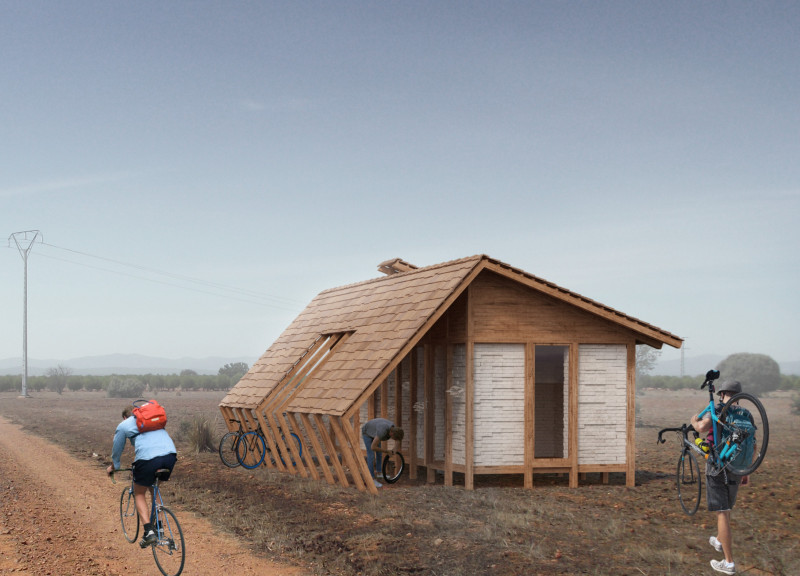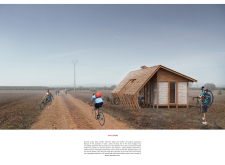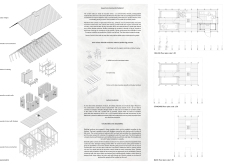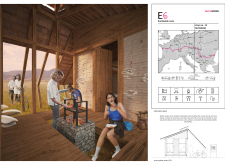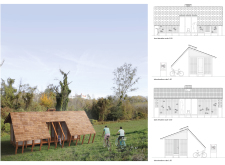Constructed with mycelium bricks and topped with cedar shingles, these modular rest areas provide sustainable support for cyclists along the EuroVelo 6 route in Slovakia.
5 key facts about this project
01
Constructed using mycelium bricks, enhancing sustainability and reducing carbon footprint.
02
Cedar shingles provide natural weather resistance and aesthetic appeal.
03
Modular design allows adaptability to various site conditions along cycling routes.
04
Includes communal cooking facilities using locally sourced stone for user interaction.
05
Strategically located to promote ecological awareness and support cycling tourism.
General keywords
Project specific keywords
The MYCostops project is a strategic architectural initiative aimed at enhancing the experience of cyclists along the EuroVelo 6 route in Slovakia. This project is designed to serve as modular rest stops that integrate seamlessly into the surrounding natural environment. By focusing on the principles of sustainability, MYCostops reassesses the role of architectural structures in outdoor recreational contexts, specifically catering to the needs of cycling tourists.
The MYCostops structures function primarily as rest and service points for cyclists, providing essential amenities such as secure bike storage, cooking facilities, and information areas about the local environment. The design employs an open and adaptable layout, allowing the project to accommodate varying site conditions while enhancing user experience.
Sustainable Material Use and Ecological Integration
A defining characteristic of the MYCostops project is its dedication to sustainability through innovative material choices. The primary structural elements incorporate mycelium bricks, a biodegradable and renewable resource that underscores the project's commitment to low environmental impact. These materials are not only functional—providing insulation and structural support—but also exemplify sustainable construction practices. Additionally, the use of cedar shingles on the roof offers natural weather resilience while introducing a tactile element to the design.
The design thoughtfully integrates features that promote environmental awareness and communal engagement. Outdoor cooking facilities made from locally sourced stone encourage shared experiences among users, while the modular nature of the stops allows for adaptability in various locations along the cycling route. This flexible approach ensures that each rest stop is responsive to its geographical context, making use of local materials where possible and mitigating the ecological footprint of construction.
Functional Layout Supporting User Experience
The internal layout of MYCostops is organized to optimize functionality for cyclists. The design includes features such as ample bike storage for security, multi-functional areas for relaxation or educational purposes, and facilities that cater to the needs of traveling cyclists. The layout is designed to promote social interaction while ensuring that users can access necessary amenities without compromising their comfort.
Moreover, the modular design allows for two configurations—Deluxe and Standard—enabling customization based on specific site requirements. Each stop can provide basic amenities or expand to include more comprehensive services depending on demand and environmental considerations.
Different from conventional roadside stops, MYCostops focuses on a user-centric experience that celebrates the cycling culture and fosters a connection to the surrounding landscape.
The MYCostops project represents a forward-thinking approach to architecture within the realm of cycling infrastructure. By prioritizing sustainability, utilizing innovative materials, and providing essential facilities to enhance user experience, it sets a precedent for future developments in outdoor recreational architecture. To gain deeper insights into the architectural plans, sections, and designs of this project, further exploration of the presentation is encouraged.
The MYCostops structures function primarily as rest and service points for cyclists, providing essential amenities such as secure bike storage, cooking facilities, and information areas about the local environment. The design employs an open and adaptable layout, allowing the project to accommodate varying site conditions while enhancing user experience.
Sustainable Material Use and Ecological Integration
A defining characteristic of the MYCostops project is its dedication to sustainability through innovative material choices. The primary structural elements incorporate mycelium bricks, a biodegradable and renewable resource that underscores the project's commitment to low environmental impact. These materials are not only functional—providing insulation and structural support—but also exemplify sustainable construction practices. Additionally, the use of cedar shingles on the roof offers natural weather resilience while introducing a tactile element to the design.
The design thoughtfully integrates features that promote environmental awareness and communal engagement. Outdoor cooking facilities made from locally sourced stone encourage shared experiences among users, while the modular nature of the stops allows for adaptability in various locations along the cycling route. This flexible approach ensures that each rest stop is responsive to its geographical context, making use of local materials where possible and mitigating the ecological footprint of construction.
Functional Layout Supporting User Experience
The internal layout of MYCostops is organized to optimize functionality for cyclists. The design includes features such as ample bike storage for security, multi-functional areas for relaxation or educational purposes, and facilities that cater to the needs of traveling cyclists. The layout is designed to promote social interaction while ensuring that users can access necessary amenities without compromising their comfort.
Moreover, the modular design allows for two configurations—Deluxe and Standard—enabling customization based on specific site requirements. Each stop can provide basic amenities or expand to include more comprehensive services depending on demand and environmental considerations.
Different from conventional roadside stops, MYCostops focuses on a user-centric experience that celebrates the cycling culture and fosters a connection to the surrounding landscape.
The MYCostops project represents a forward-thinking approach to architecture within the realm of cycling infrastructure. By prioritizing sustainability, utilizing innovative materials, and providing essential facilities to enhance user experience, it sets a precedent for future developments in outdoor recreational architecture. To gain deeper insights into the architectural plans, sections, and designs of this project, further exploration of the presentation is encouraged.


